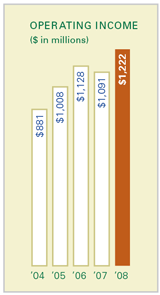Positioned for Continued Growth
At a time of economic uncertainty, Quest Diagnostics is financially strong and positioned well for continued growth. We are executing our strategic plan and see opportunities to further strengthen our competitive position during these challenging times for the following reasons:
- Diagnostic testing is an essential medical service, and is becoming increasingly recognized for being as critical to wellness and prevention as it is to diagnosing, treating and monitoring disease. We are the undisputed industry leader.
- The demographics of the growing and aging population are positive for our industry and our company. As people age, they require more testing, and we are seeing an increase in the number of tests ordered for each patient.
- We have unique assets and capabilities that enable us to better serve patients, physicians and other customers.
- Our strong financial condition, cash flow and investment grade credit rating provide us the flexibility to take advantage of growth opportunities.
- The advent of personalized medicine enables targeted diagnostic tests to help doctors make more informed therapy decisions and monitor the effectiveness of treatment. The pace of innovation in this important area is accelerating, with the frequent discovery of new biomarkers, particularly for cancer, that are the basis for new targeted tests.
- The U.S. government’s emerging healthcare plan calls for expanding access to screening tests for wellness and early detection of disease.
- Employers are recognizing the value of early detection and wellness when it comes to keeping their employees healthy and productive, as well as limiting their healthcare spending.
- Diagnostic testing is a large and still fragmented industry. We have only 15% of the market, leaving plenty of room to grow.
The Power of Early Detection of Cancer
Around the world, cancer will take an increasing toll as many populations extend their lifespans and risk factors that contribute to cancer become more prevalent in the population. In 2004, worldwide, 7.4 million people died from cancer. The World Health Organization predicts that, without new approaches, the number of cancer deaths will more than double to 17 million by 2030, when more than 26 million people will be living with cancer.
Today, we are the leading cancer diagnostics company, and perform more cancer tests than anyone else. We have a tremendous opportunity to build on this powerful position. Physicians treating cancer patients need a combination of anatomic pathology services and molecular testing, as well as routine testing. Our medical and scientific team comprises approximately 800 M.D.s and 100 Ph.D.s who review patient results, consult with treating physicians and develop new tests.
The cornerstone of improving outcomes for cancer patients is diagnostics. Diagnostics is an essential tool to monitor well-being and detect disease early, and it is beginning to personalize some treatment decisions.
We offer a comprehensive range of cancer tests that diagnose disease, identify a patient’s predisposition to disease, help doctors select the right therapy or assess the risk of disease recurrence.
Some diagnostic tests can even reduce pain for patients. Our Leumeta™ family of tests detects various signs of leukemia and lymphoma in a simple blood sample—without the need for painful bone marrow biopsies.
One of our key opportunities is the growing need for new diagnostic tests. We are accelerating our development efforts to more rapidly turn advances in basic research into benefits for patients. For example, we see opportunities to introduce new tests to detect ovarian cancer, which has proven difficult to detect early, and we have several new diagnostic tests in development. We are also working on a blood test based on the Septin 9 methylation marker to detect and monitor progression of colorectal cancer.
Perhaps the greatest opportunity to improve health outcomes involves testing that personalizes medicine. Rapid development of “companion diagnostics” that can identify patients who are candidates for specific drugs will improve outcomes and reduce costs. We are currently developing diagnostic tests that identify patients who will respond to a specific therapy. For example, our test for the gene polymorphism UGT1A1 can help identify patients with metastatic colon cancer who are likely to have adverse reactions from a first-line form of chemotherapy.
The Power of Prevention
Understanding one’s health profile and making behavioral changes based on that data can have a positive impact on personal health and reduce healthcare costs. Employers, governments and health plans are providing incentives for people to adopt healthier lifestyles and also undergo regular screening and health risk assessment. Quest Diagnostics is playing a major role in this movement.
One important way that we help employers create healthier workplaces is through our Blueprint for Wellness™ risk assessment program. This provides individuals with a comprehensive health risk report, including laboratory test results. The employees of Domino’s Pizza, the Houston Independent School District, Turner Construction Company and other large employers benefit from this wellness service.
Another way that we can empower patients to take control of their health is through our collaboration with Google™ Health. As the only laboratory partner of Google Health, we make it easy and convenient for people to manage their lab results and other health information in their personal health record. We also enable consumers to buy a limited menu of tests, directly for themselves, to monitor their health and wellness.


